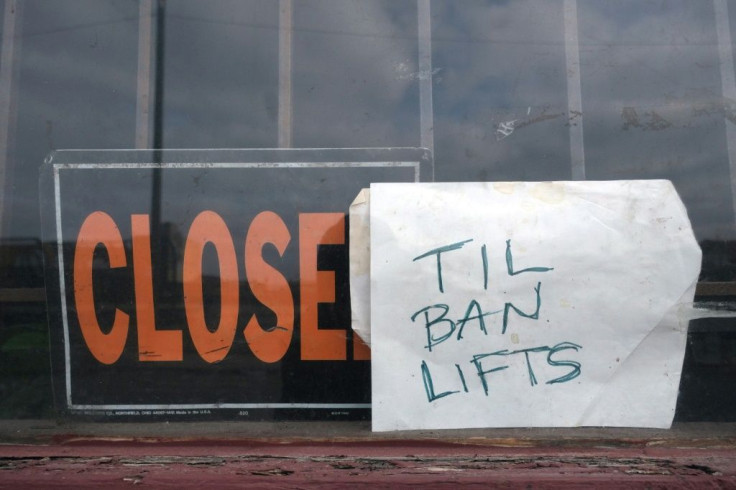More Than One-Third Of US Has Less In Emergency Savings Than Before Pandemic

KEY POINTS
- About 35% of people said their emergency savings were lower now than before crisis
- 13% said their savings had actually increased since the virus spread
- 25% of Americans said they have enough savings to cover six months of expenses
More than one-third of Americans have less in emergency savings now than they did prior to the emergence of the COVID-19 pandemic. According to a survey by Bankrate, a New York-based consumer financial services firm, about 35% of people said their emergency savings were lower now, while 13% said their savings had actually increased since the virus spread.
In online interviews conducted from July 28 - Aug. 2 of more than 1,000 adults, about 47% said their emergency savings were the same as before the crisis. About 3% responded that they had no savings before and still have none and 1% refused to answer.
About 20% said they had enough emergency savings to cover up to five months of expenses, a seven-year high.
“At the time the polling was conducted, federal unemployment assistance was in the process of expiring and without an obvious renewal or replacement, likely contributed to the level of discomfort that millions of Americans felt about their emergency savings,” says Greg McBride, Bankrate’s chief financial analyst.
Meanwhile, 25% of Americans said they have enough emergency savings to cover six months of expenses – up from 18% last year. Still, that figure remains below the 28%-31% range seen in the survey between 2016 and 2018.
“Given the relatively low levels of emergency savings, it might be surprising that so many Americans have some comfort with their emergency savings,” Bankrate said.
On the whole, 54% said they are at least “somewhat comfortable” with their savings, while 44% said they are at least “somewhat uncomfortable.” Moreover, 16% said they are “very comfortable” with the size of their emergency savings.
“More Americans have some emergency savings socked away, but what they have isn’t enough to give them a warm and fuzzy feeling amid so much economic carnage,” said McBride.
Of those who said they are “somewhat uncomfortable” or “very uncomfortable” with their emergency savings, 77% either had no emergency savings or not enough to cover three months of expenses.
“The survey suggests that Americans who had little savings since before the pandemic are most likely to have very little savings now,” Bankrate stated. “That is, the pandemic hit the least prepared the hardest.”
Not surprisingly, households that earn less than $30,000 a year felt the “most uncomfortable” with their savings. The higher the household income, the more “comfortable” they were about their savings and preparation for emergencies.
Interestingly, younger Baby Boomers — those between the ages of 55 and 65 — have particularly low savings, with 26% of them having no emergency savings at all, making them slightly most vulnerable than younger millennials (ages 24-30).
Baby Boomers aged 56-65 are also among the least likely to have enough savings to cover at least six months of expenses -- only 20% are able to do so. That figure was lower than for every group except millennials at 18%.
McBride explained to International Business Times why so many Baby Boomers have so little in savings.
“Those households most impacted by extended unemployment and underemployment following the financial crisis were those age 50 and up,” McBride said. “Not only did many run down or deplete their savings following the [Great Recession], but [they] were unable to build it back up in the years since, especially if earning less. The hangover from the last recession puts these folks in a precarious financial position in this recession.”
Interestingly, more than one-fifth, 21%, of Americans said they have no emergency savings at all – but this marked lowest such figure in the 10-year history of the Bankrate poll.
“The strength of the economy prior to the pandemic and enhanced unemployment and government stimulus checks since then have enabled some accumulation of savings in short order, particularly among households that had none in previous years,” McBride told IBT. “However, this improvement will likely prove fleeting in an environment where elevated unemployment and depressed demand aren’t going away. Many households that had accumulated savings are now, or will be, leaning on that savings to fill the gap of reduced employment earnings.”
Chad Parks, founder and CEO of Ubiquity Retirement and Savings of San Francisco, told International Business Times that the “uncertainty and pain brought about by the pandemic is something today's working population will remember for the rest of their lives. On one hand, this created a sense of urgency in people to save more where they can. On the other hand, there are others who might be struggling to get by.”
Parks added that emergency savings forms a critical component of financial wellbeing.
“Every bit you can stash away will put you in a better place in the future,” he said. “What's especially important for savers is to make clear distinctions between emergency savings and retirement savings. The latter of the two should only be tapped in worst-case-scenario situations.”
© Copyright IBTimes 2025. All rights reserved.





















